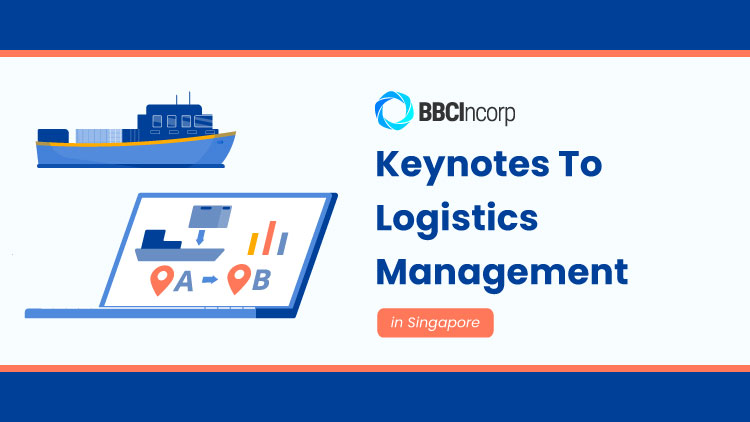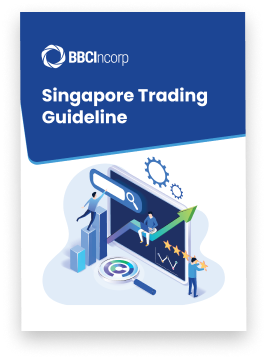
Logistics management is a critical component of any successful Singapore trading business.
In addition to minimizing the risk of lost or damaged goods, keeping your inventory organized and streamlined, and delivering orders on time, you can ensure delivery to your customers with efficient and effective logistics.
Understanding the logistical structure of a trading company
Logistics is the backbone of any business, especially trading businesses. Managing and organizing logistics is essential for any company looking to streamline its operations and optimize its profits.
A Singaporean trading company may have a variety of logistics types. The most common types are:
- Inbound logistics: receiving and organizing goods received from suppliers.
- Outbound logistics: shipping and delivering products to customers.
- Warehouse and storage: storing goods in a designated area until they are needed.
- Transport: moving goods from one place to another.
Each of these types of logistics can be further broken down into more specific tasks.
Inbound logistics might include tasks such as order processing, inventory management, and quality control. Outbound logistics might include tasks such as shipping and delivery, order tracking, and customer service.
A Singaporean trading company will typically have a team of employees who are responsible for each of these tasks. However, the company might also outsource some or all of these tasks to third-party providers.
This can be a cost-effective solution for companies that don’t have the resources or expertise to handle all of the logistics themselves.
Finally, it’s important to note that the logistical structure of a Singaporean trading company will vary depending on the type of products and services that they offer.
A company that specializes in exporting goods will have different logistics needs than a company that specializes in importing goods, to exemplify.
Quick Note
Managing logistics is a critical part of any Singaporean trading company.
By understanding the different types of logistics and the tasks involved in each, companies can create a streamlined and efficient logistical structure that will help them to optimize their profits.
Important aspects in logistics management
Logistics management is an important aspect of any business, especially crucial for Singapore trading companies.
To manage your company’s logistics effectively, you have to consider a number of factors, and if one is overlooked, it will harm your bottom line.
Warehouse management
Warehouses are an important part of the logistics process. They are used to store goods that are either being shipped out or are incoming.
Several features that you must consider when opening a warehouse:
The layout should be designed to maximize space and boost productivity for both the staff and machines. It’s best to sit down and talk with your draftsmen about exactly what you expect from the design.
Wider access doors? More conspicuous signage? Closer changing rooms? Considering these factors can make your operation run smoothly. They are among the most commonly overlooked aspects.
Notes: Golden Zoning
“Golden zoning” is the prime tenet behind warehouse design and operates on the idea of minimizing time and human effort via space optimization.
The aisles should be wide enough for a forklift to move through and the racks should be placed so that the goods can be easily accessed.
Your workers are sure to be more productive if they rarely need to lift their arms too high or do any intensive movements for long durations.
Inventory management also needs to be in place. A centralized tracking system will help tremendously in making sure there’s enough stock to fulfill customer orders. And by extension, give proper warning in case of shortage.
Staffing
Singapore trading companies rely heavily on their logistics teams to ensure that their goods are delivered on time and in the right place. They must be able to manage and coordinate the distribution of goods and materials, as well as handle any related paperwork.
Having a cohesive workforce will make or break your entire operation. With orders coming in by the dozens at a time, you need people that know when and where to be. You will need someone to manage the warehouse, goods packing, and operate the forklift.
Equipment & Transportation
When setting up a Singapore trading company, you will need to manage the transportation and equipment needs of your business.
There are several ways to manage the logistics for your Singapore trading company. Make sure to weigh up the pros and cons before making a decision.
Your search leads you to hire a company that can meet your needs. Transport and equipment will be handled by them, so you can focus on running your business. However, you will need to pay for the services, which can be expensive.
If you decide to do it yourself, you will need to invest in transportation and equipment. This can be a costly option, but it gives you complete control over the process. You will need to find and hire drivers, purchase or lease vehicles, and track shipments on your own.
A combination of both options might be the best solution for many businesses. This approach gives you the control of doing it yourself, while also benefiting from the expertise and resources of a third party.
Digital infrastructure
Having a strong digital infrastructure is essential. You need to be able to track inventory levels and shipping statuses in real-time, so you can make quick decisions about when and where to ship products.
Additionally, you would want to have systems in place that allow customers to place orders and track their shipments online. By investing in digital infrastructure, you’ll be able to keep your logistics operations running smoothly and efficiently.
Trade compliance
A Singapore trading company needs to be aware of the many tax obligations & incentives when doing business domestically and abroad. Obtaining a good understanding of the logistics involved in international trade is vital to success.
The following are some important tips to keep in mind:
- Know your laws – Make sure you know the customs and import/ export regulations that apply to your business. This will help you avoid any costly delays or fines.
- Plan ahead – When exporting or importing goods, it is important to estimate the accurate time for the necessary documentation and clearance procedures.
- Use a reputable freight forwarder – A good freight forwarder can help you navigate the complex logistics of international trade, and ensure that your goods are delivered on time and in compliance with all regulations.
- Stay up-to-date – Regulations and customs procedures can change at any time, so keep your enterprise updated on the latest changes.
Best accounting practices for your Singapore trading business
Since there are many shipping mediums involved in logistics and transportation, costs are sporadic. Any accountant who quotes prices for oil or shipping is faced with a daunting task as these rates fluctuate daily.
But it doesn’t stop there: “Same-day delivery” and “next-day delivery” is now top of mind for most consumers in today’s highly digitized shopping world.
Shipping firms are now burning the candle at both ends trying to accommodate this new trend of instant gratification while stretching their resources to their absolute limit.
We can see now how good accounting practices can add order to a generally chaotic industry. Here are some prominent practices that any trading company should follow:
Produce monthly accounts
Given how dynamic transportation and logistics are, your company should stay on its finances as often as possible. This means preparing cash flow statements, income statements, and so on every month for the entire year.
The foremost benefit you’ll get from this is saving your accountants (and yourself) from debilitating migraines trying to crunch numbers before a tax return.
Adhere to local laws
Keeping up with internal matters can take away time that should have been spent on compliance. Being held at customs for misclassified cargo or having the wrong tariff codes is unfavorable.
Therefore, stay prudent on local laws and regulations before setting up your Singapore trading business.
Update your accounting software
While most trading businesses have some form of accounting software, very few pay mind to updating them. Outdated accounting software doesn’t have much processing power, causing schisms in financial data that could affect your bottom line to various degrees.
Nowadays, it’s very common for businesses to opt for cloud-based solutions with integrated business intelligence and AI to fully accommodate the fast-moving world of data.

New guide
Unlock insights of Singapore's trading business!
Everything you need to know about starting an overseas trade business in Singapore.

Conclusion
The mentioned aspects are some keynotes to managing logistics and accounting for your Singapore trading business. With so many variables to keep track of, it’s crucial to keep tabs consistently on business operations to make sure everything is accounted for.
If you are already operating or planning to set up a trading business in Singapore, don’t hesitate to reach out through the chatbox or tell us about your business via service@bbcincorp.com.
Disclaimer: While BBCIncorp strives to make the information on this website as timely and accurate as possible, the information itself is for reference purposes only. You should not substitute the information provided in this article for competent legal advice. Feel free to contact BBCIncorp’s customer services for advice on your specific cases.
Industry News & Insights
Get helpful tips and info from our newsletter!
Stay in the know and be empowered with our strategic how-tos, resources, and guidelines.





